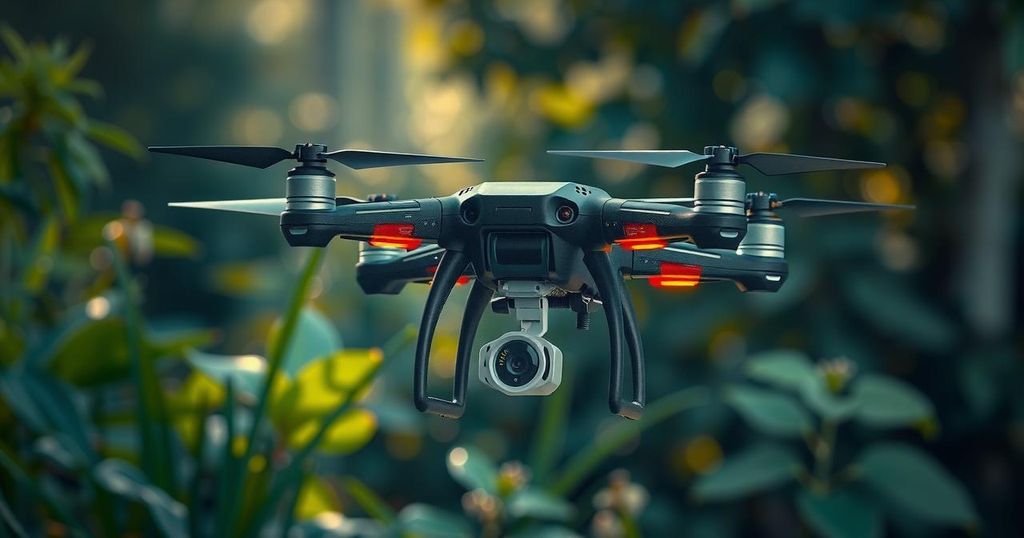Innovative UAV Project Combats Climate Change Through International Collaboration
The Combat Climate Change (C-3) UAV Project is a collaboration between Sweden and Colombia, launching a new unmanned aerial vehicle designed to monitor greenhouse gases and ecosystem health. The project involves key stakeholders including government officials from both nations and the companies Saab and EAFIT University. Officially launched at COP16, the UAV aims to complement climate data with advanced sensors, enhancing scientific understanding of climate change while fostering international cooperation.
The collaboration between Sweden and Colombia has resulted in the launch of the Combat Climate Change (C-3) UAV Project, aimed at combating climate change through enhanced research capabilities. The project brings together key players including the Minister for Climate and the Environment of Sweden, the Minister of Science of Colombia, the company Saab, EAFIT University in Colombia, and KTH Royal Institute of Technology in Sweden. Officially introduced during COP16 by notable figures such as Romina Pourmokhtari, the Swedish Minister for Climate and the Environment, and Yesenia Olaya, the Colombian Minister of Science, the UAV is designed to collect critical data for climate monitoring. This innovative unmanned aerial vehicle (UAV) will be equipped with specialized sensors to measure greenhouse gas concentrations—specifically carbon dioxide and methane—as well as other pollutants and aerosols in the atmosphere. The UAV’s capabilities also extend to analyzing the health of ecosystems, including the Amazon rainforest and agricultural lands, by observing vegetation patterns and soil conditions. The UAV’s integration into existing climate data efforts is of paramount importance. By correlating its measurements with ground images, the mission aims to enhance understanding of climate dynamics through advanced mathematical and AI-based prediction models. The initiative underscores a commitment to using technology for environmental protection. “Contributing to mitigating climate change is one of the priorities of President Petro’s government,” noted Yesenia Olaya, emphasizing the integral role that science, technology, and innovation will play in addressing climate challenges. Eva Axelsson from Saab highlighted the importance of collaboration, stating that their efforts are focused on fostering academic relationships within the framework of the Triple Helix model, which connects academia, society, and industry. Launched in February 2023, the project represents a significant international collaboration between researchers in Sweden and Colombia, providing a platform for engineers to engage and innovate within a global context. Saab’s involvement ensures a focus on integrating scientific goals with societal needs, which is crucial for promoting safety and sustainability across regions.
The Combat Climate Change (C-3) UAV Project emerges from the pressing need to address climate change through advanced research initiatives. With global warming and environmental degradation posing significant threats, the collaboration between Colombian and Swedish entities highlights the role of technology in environmental monitoring. Utilization of unmanned aerial vehicles is becoming increasingly relevant in data collection for climate research, illustrating an innovative approach to observing ecosystem health and pollutant levels. This partnership not only aims to enhance scientific understanding of climate factors but also exemplifies international cooperation in environmental sustainability efforts, crucial for global climate strategies.
In conclusion, the collaboration between Sweden and Colombia through the Combat Climate Change UAV Project represents a significant advancement in climate monitoring technology. The project illustrates a robust commitment to leveraging innovation and international partnership for environmental protection. By deploying specialized UAVs to gather critical data on greenhouse gas concentrations and ecosystem health, this initiative is set to enhance our understanding of climate dynamics and contribute to informed decision-making in the fight against climate change. Through such cooperative models, it is possible to harness technology for sustainable outcomes, ultimately aiming for a safer and more resilient global environment.
Original Source: www.saab.com




Post Comment